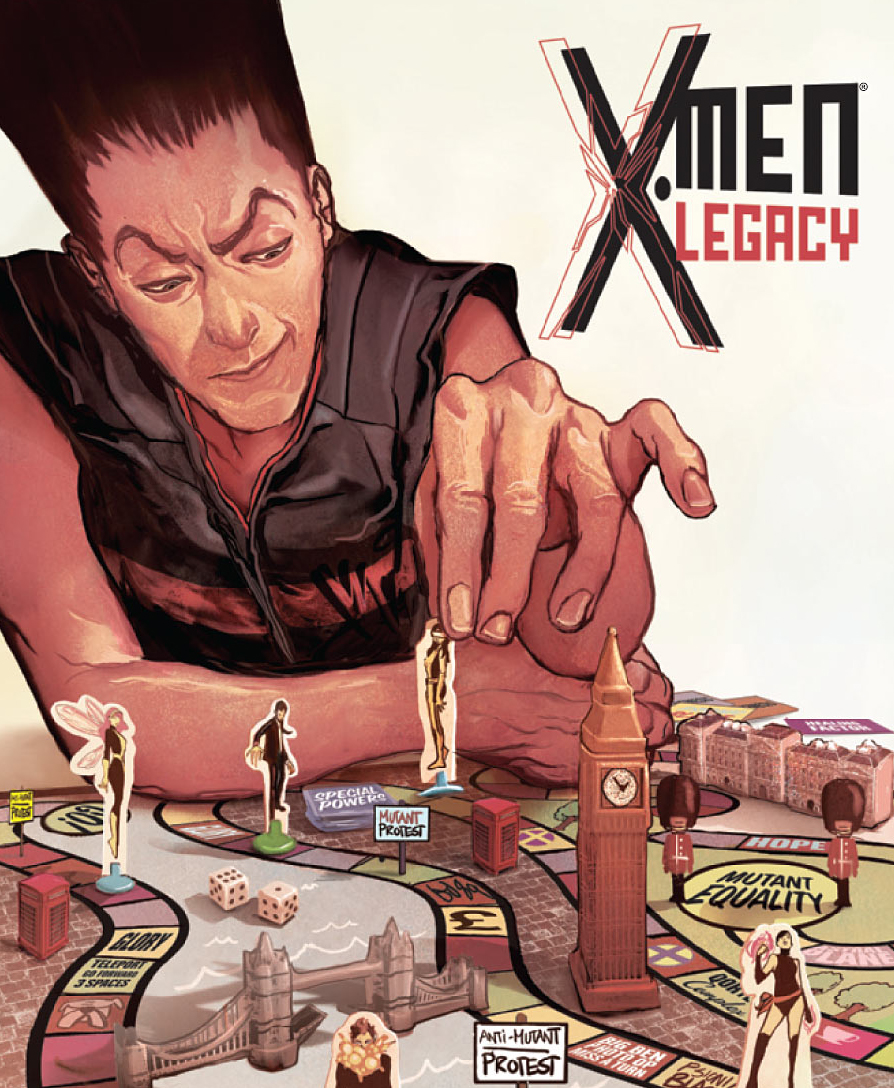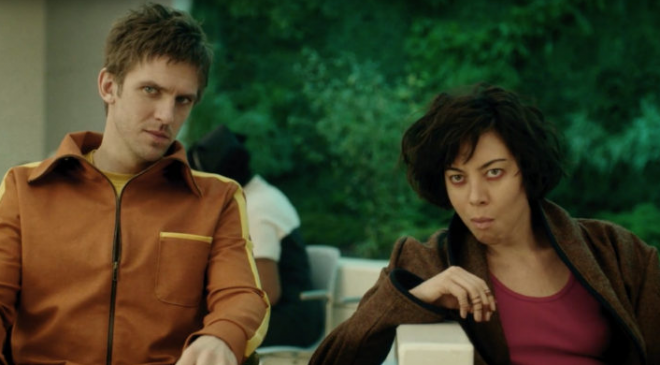‘Legion’ Review: Is This X-Men Show The Next Big Thing For The Superhero Genre?
Our most cinematic, interesting superheroes are now all on TV.

Labyrinthine in structure and lusciously over-the-top in style, Legion is here to freshen up the superhero genre just as we’ve begun to groan at each new release. At least, that’s what it’s shooting for.
The new show from Marvel, tangentially linked to the already confused X-Men universe, is about a troubled young man who must find out if he’s plagued by problems or powers. The character and show both beg the same question. Is this the possible saviour of its kind; a new, deeper, more complex breed of hero… or is it just bonkers?
Little Guys and Big Ideas
It’s near impossible to seamlessly adapt one medium to another, and it’s a fool’s errand to approach such an adaptation with expectations of fidelity. It only takes one exclamation of ‘they’re not doing it right!’ to turn considered critic into whiny toddler; one thrown bottle of juice to selfishly delegitimise an artist’s postmodern right to make a work their own. As thread upon thread of online screed make clear, comic book nerds can be the biggest offenders, quibbling over make-believe as it leaps from musty four-coloured pages to the often three-dimensional screen.
So how do you stay true to the source material and make something interesting enough to stand on its own?
The superhero genre has previously scuttled the plans of the likes of Darren Aronofsky (Batman) and Edgar Wright (Ant-man), and flattened the flair of Matthew Vaughn and Kenneth Branagh. Legion attempts to buck the trend, making something fresh out of a genre that’s gone stale from overexposure. It does this by reinserting the playful investigation of the deeply personal that comic books do so well.
The film and television departments at Marvel Studios have done a smart thing in expanding their options beyond top-tier players (think Spiderman and Wolverine) to embrace the obscure, recently serving up projects such as Guardians of the Galaxy and Jessica Jones. These lesser loved or little known properties rely not on brand-awareness but their potential to be something individual amongst the crowd — often knowingly ridiculous, or politically personal.
Legion’s chief creative Noah Hawley is another near unknown who might have the power to change everything. After two critically acclaimed seasons of Fargo — that showed he had the chops to mimic the Coen Brothers’ oeuvre without setting teeth on edge — Hawley has been handed a Marvel property and apparently been given free range.
Though it’d be remiss not to credit the two creative runs in the comics that inspired both the series’ plotting and design — Chris Claremont and Bill Sienkiewicz (circa 1983) and Si Spurrier, Tan Eng Huat and Jorge Molina among others (circa 2012). Claremont brought a serious exploration of emotion and identity to his writing, making him a perfect fit for the identity politics soap opera that characterised the X-Men comics most successful run, while Spurrier’s more recent efforts added the surrealist mindscapes and snarky banter that characterise Hawley’s take on the tale.
Si Spurrier’s work on the character of Legion shifted him from explosive plot device to a tongue-in-cheek study on mental illness and outsiderness.

Hawley draws heavily from both iterations of the character, and the pop art and pop psychology that have long framed him. But it’s the loopy pyrotechnics of Tim Burton, Jean-Pierre Jeunet, and Terry Gilliam that have most clearly influenced Hawley in his efforts to craft an auteurist superhero show.
Funnily enough, Terry Gilliam was once in talks to direct just such a project — the big-screen adaptation of Alan Moore’s The Watchmen. Legion acts almost as a historical do-over of this project, a ‘What If’ given wings and a premium cable special effects budget.
Hawley and his co-directors fish-eye every close up, oversaturate every polyester interior, and drop winking soundtrack riffs to punctuate the already exclaiming action. There isn’t a set that’s not goosed with boggle-eyed kid junk, jalopy-esque tech, or a taxidermied goat. The lighting and sound glitch and twitter and, in the first couple of episodes, linear narrative is thrown out the window like a Day-Glo pop modernist lamp — all the better to place us in David’s medicated, mutated and misfiring mind.
How It Stacks Up
Despite the stylistic flair, the plot of Legion quickly simmers down to something more standard; a government agency versus oddball rebel riff that’s usually the bread and butter of mainstream procedurals — think Person of Interest, Burn Notice, or that queer duck from the ’90s The Pretender.
Hawley stacks his deck with great character actors (Hamish Linklater, Jean Smart, Bill Irwin), but they never rise above their stock expository roles. The cast’s racial diversity is similarly simplistic, with roles such as ‘Guy Who Goes Into Memories’ and ‘Woman With Some Kind Of Glower Powers’ going to people of colour, while the leads are resoundingly blonde and blue eyed.

It’s not easy meeting Hollywood’s narrow standards of beauty and also having superpowers.
David is played by Downton Abbey’s Dan Stevens, shallow and handsome in a leading role that could have gone to a true character actor. Watching him twitch his way through drug trips and hallucinations makes you wish they’d taken a chance on the next Joaquin Phoenix or Giovanni Ribisi (and reaffirm Brad Pitt’s abilities to hide his looks when the role asks for it).
Aubrey Plaza’s mugging is just kind of awkward; she seems to aim for Angelina Jolie’s break out Girl, Interrupted performance, but instead just plays as a messy-haired run on her most goofball Parks and Recreation antics.

Shhh, we’re being very edgy.
It’s hard not to rack up the comparisons when watching Legion. If you’ve seen a ’90s drug’n’grunge flick (Trainspotting, Requiem for a Dream, the best forgotten Spun) you’ve copped some of these camera angles. If you’ve been to film school, you’ll spot the Kubrick-inspired set design. If you’ve read a comic book, you know the story. Is Legion more than the sum of its parts? Can you re-skin standard genre fare and ask your audience to believe it’s something new? Mr Robot and Stranger Things have proven an audience for routine thrills with a glossy cinematic sheen is here, and hungry.
The emotional through-line of David, a man trying to understand his own past and mind, will hit some viewers as apt metaphor, but I think it might leave others cold. What if the blips in our brain chemistry were not a deficiency, but an ability yet to be employed? Like the worst autism-as-superpower movies, Legion walks the perilously fine line of empowering those who must adjust and adapt to otherness, and ignoring their real hardships in a race to make them heroes.
It’s yet to be seen whether Hawley has something to say on the matter of mental illness, or just likes the opportunity to make a flashier splash on screen. It’s a topic worth exploring, and he has the budget and chutzpah to tackle it in an innovative fashion. But with great power comes great responsibility, and Legion, so far, has yet to clearly learn that lesson.
–
Legion premieres on Foxtel’s FX at 7.30pm, Thursday February 9.
–
Matt Roden hosts the Perfect Pitch podcast, where he and his writer/comedian friends catalogue 100 new ideas for movies so Matt doesn’t get sued by Hollywood.






